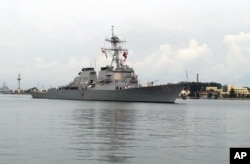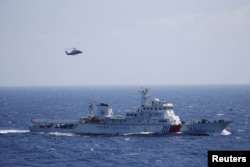U.S. President-elect Donald Trump did not make the maritime disputes in South China Sea a major part of his election campaign and his approach to Asia’s most expansive sovereignty disagreement is still not clear.
Some experts predict, however, that he will make a few strident anti-Beijing military moves in the area to prove a point and then back off to engage the Chinese economically.
Trump South China Sea policy
People who follow U.S. policy in Asia expect Trump to make a quick show of force. That show might include passage of U.S. naval ships through the 3.5 million-square-km (1.4 million-square-mile) sea to show it is open to all countries despite China’s claim to the entire body of water, said Sean King, senior vice president with the New York political consultancy Park Strategies.
They say a military move would support anti-China campaign remarks by Trump, who ran on the Republican Party ticket, and let him appear tougher than current President Barack Obama of the rival Democratic Party. Some in Trump’s camp may see a loss to the United States as the Philippines, a sea claimant and traditional U.S. ally, has moved closer to Beijing since June.
“He has to flex American muscle,” said Eduardo Araral, an associate professor at the National University of Singapore’s public policy school. “He has to tell his domestic constituency he has won back the Philippines that was lost to China. So he needs to show his constituency that he has won where Obama has failed.”
Trump has yet to roll out a formal South China Sea policy. The United States is not among the six claimant governments, but Obama has used verbal warnings and periodic military movements to check China, the biggest force in the dispute.
The New York real estate billionaire said on his campaign website that a stronger U.S. military deployment in the South China Sea would counter Chinese “adventurism” as Beijing tries to expand its influence. Trump also criticized China for taking disputed islets in the sea and reclaiming land for others. China has reclaimed an estimated 3,200 acres (1,295 hectares).
“A strong military presence will be a clear signal to China and other nations in Asia and around the world that America is back in the global leadership business,” the campaign website said.
Economic reality
Once Trump has shown initial force in the sea, his government will probably drop military action in favor of a practical business partnership with China, analysts say.
“Details are scarce as to what Trump’s policy approach to the Asia Pacific might look like, and many of his off-the-cuff remarks have sent mixed signals about how the administration might proceed,” said Jonathan Spangler, director of the Taipei-based South China Sea Think Tank. “Had Clinton won the election, there’s little doubt that she would have continued to prioritize the Asia Pacific region.”
Cabinet an indicator
An Asia policy might become clearer when Trump picks policy architects such as the next secretaries of state and defense, King said.
“China will likely find a business-minded leader like Trump to be easier to influence than a political and ideologically minded leader like Clinton,” Spangler forecast.
Trump takes a cold view toward free trade, a core part of Sino-U.S. ties today. He has called China a “cheater” and a “currency manipulator.” But ultimately he will reach out to the Communist leadership in the interest of American businesses that rely on Asia’s biggest market and manufacturing base, analysts believe.
Exports of American goods to China totaled $113 billion in 2015. That figure made China the third biggest destination for American products after Canada and Mexico, the nonprofit advocacy group US-China Business Council said in a report this year.
“At the end of the day Trump is a marketing man,” Araral says. “He wants to make deals. If it brings domestic benefits to the U.S., he will do it.”
Trump may also cut the military budget as part of a refocus on domestic policy, limiting action in the South China Sea, said Lin Chong-pin, a retired strategic affairs professor in Taipei.
“When Donald Trump ascends to the presidency, he will scale back the military presence in [the] South China Sea for sure,” Lin said. “Of course Beijing is silently smiling now.”
China has irritated Brunei, Malaysia, Taiwan, Vietnam and the Philippines by passing vessels through their claimed exclusive economic zones of 200 nautical miles (370 kilometers) off their coastlines and occupying islets in those zones.
Beijing, which claims about 95 percent of the sea that extends from Taiwan to Singapore, began a visible expansion push in 2010 into the tropical body of water prized for fisheries, gas, oil and commercial shipping lanes.






